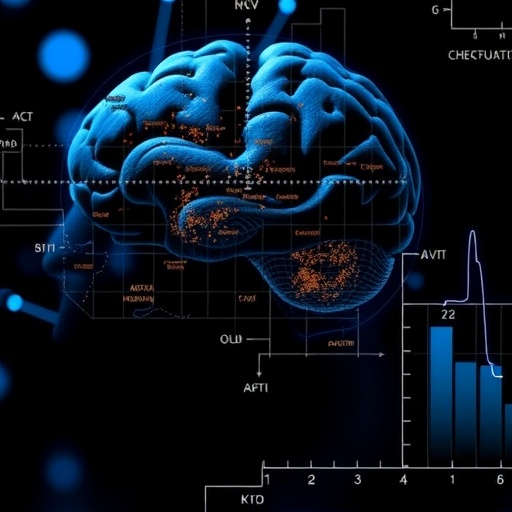In a groundbreaking study published in the latest issue of npj Parkinson’s Disease, researchers have illuminated the complex genetic landscape underpinning Parkinson’s Disease (PD) among multi-ethnic Asian populations. The focus is on two prominent variants of the LRRK2 gene, p.G2385R and p.R1628P, which have sparked considerable interest due to their prevalence and diverse effects in different ethnic groups. This comprehensive investigation not only enhances our understanding of the epidemiology of Parkinson’s in Asia but also provides invaluable clinical insights that could tailor future therapeutic strategies.
Leucine-rich repeat kinase 2 (LRRK2) mutations are among the most significant genetic contributors to Parkinson’s Disease worldwide. Historically, studies have primarily focused on Caucasian cohorts, leaving a glaring gap in our comprehension of how these mutations affect diverse populations, especially those across Asia. This study by Goh et al. aims to bridge this gap by meticulously analyzing the prevalence, penetrance, and clinical presentations associated with the p.G2385R and p.R1628P variants among a rich mosaic of Asian ethnicities.
A striking revelation of the study is the differential frequency of these variants across ethnic subgroups. The p.G2385R variant emerges predominantly in East and Southeast Asian populations, whereas p.R1628P appears more sporadically but with notable clinical implications. This ethnic variability underscores the importance of population-specific genetic screening in Parkinson’s diagnostics, discrimination, and prognosis. It challenges the one-size-fits-all approach and pushes forward personalized medicine paradigms.
Clinically, the presence of these LRRK2 variants correlates with nuanced variations in disease onset, progression, and symptomatology. Intriguingly, patients harboring the p.G2385R variant tend to exhibit a slightly earlier disease onset but display a relatively slower motor decline compared to those without this mutation. Conversely, the p.R1628P variant manifests a more aggressive disease trajectory, with rapid progression and an increased burden of non-motor symptoms like cognitive impairment and autonomic dysfunction. These findings redefine the conventional clinical phenotyping and encourage genotype-informed patient management.
Technically, the study harnesses state-of-the-art genomic sequencing methods, coupled with robust bioinformatics pipelines, to accurately characterize genetic variants. High-throughput sequencing technologies enabled the detection of rare mutations with remarkable precision, and subsequent validation in large cohorts reinforced the reliability of the data. Moreover, the researchers integrated clinical data using advanced statistical modeling to correlate genetic findings with phenotypic outcomes, achieving a multidimensional perspective of disease biology.
Beyond the genetic and clinical correlations, the paper explores the molecular underpinnings by which these variants influence LRRK2’s enzymatic functions. LRRK2 encodes a kinase involved in multiple cellular pathways, including autophagy, vesicular trafficking, and neuroinflammation. Alterations introduced by p.G2385R and p.R1628P affect its kinase activity, leading to dysregulated signaling cascades that promote neuronal vulnerability and death, hallmark features of Parkinson’s pathology.
Importantly, the study’s emphasis on a multi-ethnic Asian cohort fills a critical void left by the genetic research community, which often marginalizes non-European populations. This inclusive approach ensures that diagnostic tools and therapeutic interventions developed henceforth are more equitable and effective across global demographics. Furthermore, it lays the groundwork for longitudinal studies to monitor how these variants interact with environmental factors over time, potentially revealing modifiable risk factors.
While these findings offer promising avenues, the authors caution that the heterogeneity within Asian populations necessitates further subdivision and tailored analyses. The unique genetic ancestries, lifestyle factors, and healthcare access disparities could modulate the penetrance and expression of these LRRK2 variants, complicating the translational pipeline from bench to bedside.
The clinical implications extend into genetic counseling realms, where identifying carriers of these variants can allow for earlier intervention strategies, possibly delaying onset or mitigating disease severity. Additionally, understanding variant-specific disease courses may revolutionize clinical trial designs by stratifying participants based on genotype, thereby enhancing the efficacy and clarity of treatment outcomes.
Future research inspired by this work may delve into developing targeted therapies that modulate the aberrant kinase activity associated with these LRRK2 variants. Pharmacological agents that specifically inhibit or rectify dysfunctional LRRK2 signaling pathways hold potential to slow or halt Parkinson’s progression, offering hope beyond symptomatic relief towards disease modification.
Moreover, the comprehensive dataset and analytic framework provided by this study serve as a valuable resource for the broader neuroscientific community. Cross-referencing these genetic insights with proteomic and metabolomic data could unravel additional layers of complexity, advancing precision medicine for neurodegenerative disorders.
In summary, the meticulous epidemiological and clinical dissection of LRRK2 p.G2385R and p.R1628P variants in a multi-ethnic Asian Parkinson’s cohort represents a pivotal step forward. It challenges previous paradigms, enriches the genetic narrative of PD, and paves the way for innovative clinical interventions. The global Parkinson’s research field stands to benefit enormously, driving progress toward equitable, effective, and personalized care for millions affected by this debilitating disease.
As the Parkinson’s community anticipates further groundbreaking discoveries building upon these findings, it becomes evident that embracing genetic diversity is not merely an academic exercise—but a necessity for conquering neurodegeneration on a global scale. This study exemplifies the power of collaborative, inclusive research in unraveling complex diseases and igniting hope for a future where Parkinson’s can be reliably predicted, prevented, and ultimately cured.
Subject of Research: The epidemiology and clinical characteristics of LRRK2 p.G2385R and p.R1628P variants in multi-ethnic Asian populations with Parkinson’s Disease.
Article Title: LRRK2 p.G2385R and p.R1628P variants in a multi-ethnic Asian Parkinson’s Cohort: epidemiology and clinical insights.
Article References:
Goh, J.W., Lim, J.L., Toh, T.S. et al. LRRK2 p.G2385R and p.R1628P variants in a multi-ethnic Asian Parkinson’s Cohort: epidemiology and clinical insights. npj Parkinsons Dis. 11, 320 (2025). https://doi.org/10.1038/s41531-025-01166-x
Image Credits: AI Generated




